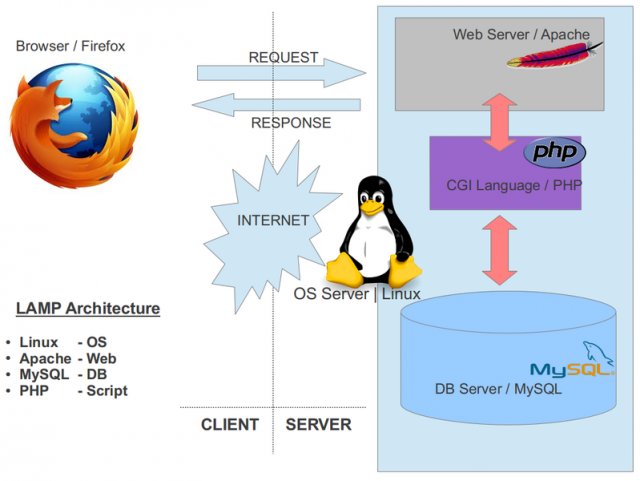Php
<slidy theme="aa" />
PHP
- Server side programming language
- LAMP model
Hello World
<!DOCTYPE html>
<meta charset=utf-8>
<title>PHP Test</title>
<?php
echo 'Hello World';
?>
- Every block of PHP code must start with <?php and end with ?>.
- You need to place a semi-colon (;) at the end of each line of PHP code.
- variable names must start with a dollar sign ($).
pros
- widely supported (php.net)
- frameworks (Zend, CodeIgniter, CakePHP etc)
- easy to learn
- copy paste
- Object Oriented Programming
- Supports anything from database managing to image modification
cons
- too easy -> not safe
- easy to write bad spagetti code
- messy, inconsistent language
- not so widely used for applications
- error logs /cat /var/log/apache2/error.log
- or run the file
Mixing with HTML
<?php
// this is a PHP comment
$myHeader = "Header made with echo";
echo "<h3>".$myHeader."</h3>";
?>
<!-- Is similar to (note HTML comment) -->
<?php $myHeader2 = "Header made with with HTML"; ?>
<h3> <?php echo $myHeader2; ?> </h3>
- you can insert any amount of php blocks in a HTML page
Function syntax
function myFunction() { //declares a function, this is named myFunction
return 'John Doe'; //returns the value 'John Doe'
}
echo 'My name is ' . myFunction() . '!';
//outputs the text concatenated with the return value of myFunction.
//myFunction is called as a result of this syntax.
//The result of the output will be 'My name is John Doe!'
- function FunctionName (Arguments){ echo 'test'; }
Weirdness of PHP
<?php
if("foo" == TRUE){
echo 'YES! foo == TRUE, but we didnt define it yet? Well okay....</br></br>';
}
if("foo" == 0){
echo 'Huh? "foo" is also a number?</br></br>';
}
if(TRUE == 0){
echo 'therefor True is also 0, right?! ';
}else{
echo "WRONG!";
}
?>

